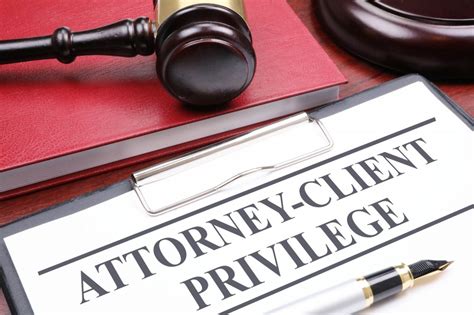The A-to-Z Guide to Attorney-Client Privilege Law

Hello, readers! 
Welcome to our comprehensive guide to attorney-client privilege law. In this article, we’ll delve into the intricacies of this crucial legal concept that safeguards your confidential communications with your attorney. Whether you’re a lawyer, a client, or simply curious about your rights, this article will provide you with valuable insights.
Since time is precious, we’ve organized our guide into bite-sized sections and subsections that you can easily navigate. Let’s dive right in!
Section 1: Understanding the Basics of Attorney-Client Privilege
What is Attorney-Client Privilege?
Attorney-client privilege is a legal principle that protects confidential communications between a client and their attorney. It’s a cornerstone of our justice system, ensuring that clients can seek legal advice without fear of their conversations being disclosed to third parties.
When Does Attorney-Client Privilege Apply?
The privilege applies when:
- There is an attorney-client relationship (established through retaining or consulting an attorney)
- The communication is confidential (intended to be kept private)
- The communication is made for the purpose of obtaining legal advice
Section 2: The Scope and Limitations of Attorney-Client Privilege
What Communications Are Protected?
Protected communications include:
- Verbal and written communications
- Notes, emails, and text messages
- Documents and records created for legal advice
Exceptions to the Privilege
There are a few exceptions to the privilege, including:
- Communications that involve a crime or fraud
- Communications that are made in the presence of a third party
- Communications that are not intended to be confidential
Section 3: The Importance of Attorney-Client Privilege
Safeguarding Client Confidentiality
Attorney-client privilege is essential for maintaining client confidentiality. Clients need to feel comfortable sharing sensitive information with their attorneys to receive effective legal advice.
Promoting Trust and Communication
The privilege fosters trust between clients and attorneys, enabling open and honest communication. This is crucial for building a strong attorney-client relationship.
Ensuring Access to Legal Representation
The privilege ensures that individuals have access to legal representation without fear of their communications being used against them.
Section 4: Protecting Your Attorney-Client Privilege
Communicate with Care
Be mindful of who you communicate with and the sensitivity of the information you share.
Keep Records Confidential
Store confidential communications securely and avoid sharing them with unauthorized individuals.
Consult an Attorney
If you have any concerns about maintaining your attorney-client privilege, consult with an attorney for guidance.
Section 5: Attorney-Client Privilege in Different Contexts
| Context | Applicability |
|---|---|
| Criminal Cases | Protects communications related to legal defenses, plea negotiations, and trial strategies |
| Civil Cases | Protects communications related to settlement negotiations, discovery disputes, and witness preparation |
| Internal Investigations | Protects communications between an attorney and employees or agents of a corporation |
| Grand Jury Proceedings | Generally not applicable, unless the client is compelled to testify against their attorney |
| Administrative Proceedings | Varies depending on the specific agency or proceeding |
Conclusion
Attorney-client privilege law is a complex but essential aspect of our legal system. It ensures that clients can communicate openly with their attorneys, promoting trust, confidentiality, and access to justice. By understanding the basics and exceptions of the privilege, you can protect your rights and maintain the integrity of your attorney-client relationship.
For further exploration, check out our other articles on legal topics:
- [Legal Malpractice: What It Is and How to Protect Yourself](article link)
- [The Importance of Wills and Estate Planning](article link)
FAQ about Attorney-Client Privilege Law
What is attorney-client privilege?
Attorney-client privilege is a legal principle that protects confidential communications between an attorney and their client.
What types of communications are privileged?
Communications are privileged if they are confidential, made for the purpose of obtaining legal advice, and in the course of the attorney-client relationship.
Who can claim attorney-client privilege?
Only the client can claim attorney-client privilege. An attorney cannot assert the privilege against their client’s wishes.
What are the exceptions to attorney-client privilege?
There are a few exceptions to attorney-client privilege, such as when the communication is:
- Related to future crimes or frauds
- Made for the purpose of seeking advice on how to commit a crime
- Disclosed to a third party without the client’s consent
How long does attorney-client privilege last?
Attorney-client privilege lasts indefinitely, even after the attorney-client relationship ends.
What if I am subpoenaed to testify about communications with my attorney?
You can assert attorney-client privilege to prevent disclosing the privileged communications.
Can I waive attorney-client privilege?
Yes, you can waive attorney-client privilege by voluntarily disclosing the privileged communications.
What are the consequences of waiving attorney-client privilege?
Once you waive attorney-client privilege, the communications can be used against you in legal proceedings.
How can I protect my attorney-client privileged communications?
You can protect your attorney-client privileged communications by:
- Communicating with your attorney confidentially
- Limiting the number of people who are present during communications
- Using secure forms of communication, such as encrypted email
What should I do if I am concerned about attorney-client privilege?
If you are concerned about attorney-client privilege, you should speak to an attorney. An attorney can advise you on your rights and help you protect your privileged communications.





